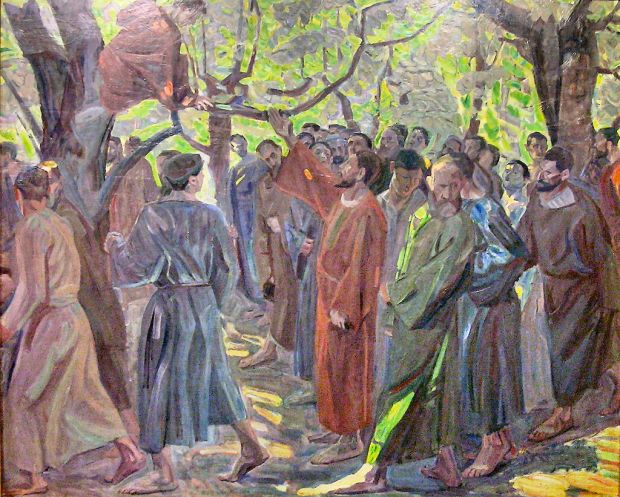
“THE WORLD is charged with the grandeur of God” (Father Gerard Manley Hopkins)
Religious poetry can be very healing and comforting inasmuch as it draws us closer to God who is the source of all goodness and well-being. Poetry in general has always had a metaphysical dimension, but religious poetry has a theological dimension because it is specifically God-directed. “And our hearts are restless,” says Saint Augustine, “until they rest in God.” Poetry can help us to attain to this rest in God, which in turn enhances our well-being.
Psalm 23 can be particularly comforting:
The Lord is my shepherd;
I shall not want.
He makes me to lie down in green pastures;
He leads me beside the still waters.
He restores my soul;
He leads me in the paths of righteousness
For His name’s sake.
Yea, though I walk through the valley of the shadow of death,
I will fear no evil;
For You are with me (vs. 1-4)
Psychiatrist Smiley Blanton relates he had little success in treating a patient’s depression until he began reading to her these words from Cardinal Newman’s poem Lead, Kindly Light:
Lead, kindly Light, amid the encircling gloom,
Lead Thou me on!
The night is dark, and I am far from home—
Lead Thou me on!
Keep Thou my feet; I do not ask to see
The distant scene—one step enough for me.
I was not ever thus, nor prayed that Thou
Shouldst lead me on.
I loved to choose and see my path; but now,
Lead Thou me on!
I loved the garish day, and, spite of fears,
Pride ruled my will: remember not past years.
So long thy power hath blessed me, sure it still
Will lead me on;
O’er moor and fen, o’er crag and torrent, till
The night is gone;
And with the morn those angel faces smile
Which I have loved long since, and lost awhile.
Dr. Smiley states: “Later, I explained that her depression would take some time to cure but that her recovery would be hastened if she would just try to relax for an hour or so each day and as far as possible banish all unpleasant thoughts from her mind. And I recommended she prepare herself by reading this poem and some others…. (The Healing Power of Poetry, p.30).” Dr. Smiley further states that “I write from a long experience in using poetry as a specific means of therapy.”
The poetic originality of the priest-poet Gerard Manley Hopkins has a profound rejuvenating quality to it. Here we look at his masterpiece, God’s Grandeur.
THE WORLD is charged with the grandeur of God.
It will flame out, like shining from shook foil;
It gathers to a greatness, like the ooze of oil
Crushed. Why do men then now not reck his rod?
Generations have trod, have trod, have trod;
And all is seared with trade; bleared, smeared with toil;
And wears man’s smudge and shares man’s smell: the soil
Is bare now, nor can foot feel, being shod.
And for all this, nature is never spent;
There lives the dearest freshness deep down things;
And though the last lights off the black West went
Oh, morning, at the brown brink eastward, springs—
Because the Holy Ghost over the bent
World broods with warm breast and with ah! bright wings.
What is it about this poem that heals us? It is as W.H. Gardner observes of Hopkin’s poetry the “sensation of inscape – a quasi-mystical illumination, a sudden perception of the deeper pattern, order, and unity which gives meaning to external forms….” (Penguin Poets, Gerard Manley Hopkins, Introduction). Hopkin’s poetry frees us from the excessive analysis that burdens the mind and takes us back to the “primal intensity” of simplicity and beauty that draws us nearer to God. Here is another example of “inscape” in Hopkin’s poetry:
Pied Beauty
Glory be to God for dappled things
For skies of couple-colour as a brinded cow;
For rose-moles all in stipple upon trout that swim;
Fresh-firecoal chestnut-falls; finches’ wings;
Landscapes plotted and pieced—fold, fallow, and plough;
And all trades, their gear and tackle and trim.
All things counter, original, spare, strange;
Whatever is fickle, freckled (who knows how?)
With swift, slow; sweet, sour; adazzle, dim;
He fathers-forth whose beauty is past change:
Praise Him.
(Gerard Manley Hopkins, S.J.)
G.K. Chesterton, who was a convert, also speaks to the healing dimension of poetry in a very unique way. He says: “Imagination does not breed insanity. Exactly what does breed insanity is reason. Poets do not go mad; but chess-players do. Poetry is sane because it floats easily in an infinite sea; reason seeks to cross the infinite sea, and to make it finite. The poet only desires exaltation and expansion, a world to stretch himself in. The poet only asks to get his head into the heavens. If the madman could for an instant become careless, he would become sane” (as edited). Mysticism, says Chesterton, “keeps men sane. As long as you have mystery you have health; when you destroy mystery you create morbidity. The ordinary man has always been sane because the ordinary man has always been a mystic.” It is because poetry can express meaning with less restrictions than a purely rationalistic approach to life, and is therefore not enclosed in the “prison of one thought,” that it more closely approaches the frontier of “first principles,” the light of which “we look at everything” else.
John Ciardi once said that “Poetry itself is a religion; it gives meaning to life.” Paul Roche adds that poetry “is in touch with a wider, deeper and more immediate range of being.” But religious poetry goes even further than this: it puts us in touch with the primordial reality of all things: God who has life in Himself. The greatest value of (religious) poetry, then, when read and meditated upon, is that it restores our own being in God. Now that’s Catholic strength!
Thomas Mulcahy, M.A.
Ref. I am relying primarily on The Healing Power of Poetry by Dr. Smiley Blanton (Guidepost Associates, Inc.). Nothing in this note is intended to be a substitute for good and necessary medical and professional care. I am quoting from Chesterton’s classic book, Orthodoxy.
Note on poetry and prayer: When the words of a poem, deeply experienced, elevate your heart to God there is in this moment an invitation to prayer. It is not to be forgotten that the ultimate purpose of meditation is to enkindle prayer and conversation with God. On this point see Pope Benedict XVI’s address of August 31, 2011 wherein he discusses how “artistic beauty can lead the heart to God” and prayer. See also Conversation With Christ by Thomas Rohrbach. Prayer unites us to God.
Photo: Gerard Manley Hopkins (Public Domain, U.S.A.)
To SHARE on SOCIAL MEDIA: click on “Leave a comment” or “Comments” below (and this will bring up social media icons if they are not already present).
To LEAVE A COMMENT: click on “Leave a comment” or “Comments” below, and then scroll down to the box which says, “Leave Your Own Comment Here,” which is at the end of any comments already made. If the comment section is already present, merely scroll to the end of any comments already made.
Any ads following this note are by WordPress and not CatholicStrength.













